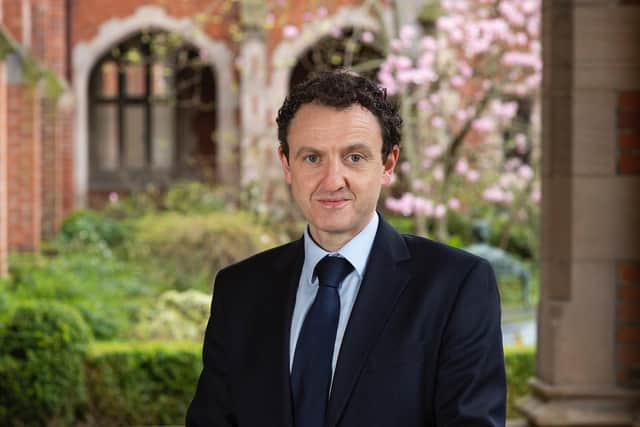OPINION: Ireland’s future: We must talk about referendums more, not less - Colin Harvey
and live on Freeview channel 276
The extent of public comment is remarkable and should surprise no one. It would be odd if people were not considering their options in the face of Brexit.
The only useful way forward is to stabilise matters here by doing the detailed and required planning now, wrapping as much clarity around the process as possible. We need to talk about referendums and their consequences more, not less, and with much more precision.
Advertisement
Hide AdAdvertisement
Hide AdWill organisations, communities and individuals be ready and prepared when the time comes? If you are campaigning, what will you be saying? If you cannot answer those questions, then what are you doing about it?


The future of this region rests on democratic consent, a reality woven securely into the Good Friday Agreement. The people of the island of Ireland have a right to self-determination. It does not belong to politicians or institutions. The tendency to portray this as problematic remains unhelpful, but such negativity appears to be waning.
We must learn to live with the fact that our constitutional status is an open question. There is no ‘settlement’ here. Although there has been great progress with wider political, civic and academic recognition, there is still some push back.
Comments from the current Irish Government ruling out referendums, and even inserting additional preconditions, seem odd and raise intriguing questions about compliance with the Agreement. Some of this appears motivated by anxiety around referendums themselves. Almost an unwillingness to contemplate asking people to make a choice, combined with a worry about the implications.
Advertisement
Hide AdAdvertisement
Hide AdMuch of this is well intentioned. But the threat of violence cannot credibly stand as an impediment to the conversation. All democratic processes involve making informed and often difficult decisions with consequences. Better to acknowledge the basis for the current discussion, what is involved in preparing and, then, managing the process responsibly.
It is apparent that many are, quite rightly and sensibly, just getting on with doing the work. They remain the responsible people in the virtual room.
Not everyone thinks so, but a timeframe will assist. An anniversary of the Agreement seems to be a possibility, for example. You decide which one. The decade ahead is also increasingly referenced. While concern about concentrating on dates has genuine merit, there is so much uncertainty around that providing more clarity would ease anxieties.
There is even a need to jolt people into action and out of the existing complacency. Deferring the homework is understandably human, but it still needs to be done. It is doubtful many projects would be completed on this island without a timeline. The constant deployment of immeasurable and nebulous abstractions to counter concrete preparatory steps helps no one and, arguably, increases instability.
Advertisement
Hide AdAdvertisement
Hide AdSo, just let people know the timeframe, as only one part of securing the parameters of the process in advance, and, thus, offering necessary reassurance. In this context, proposals for enhanced civic engagement, a deepening research agenda and more intensive British-Irish co-operation all make good sense.
In the end, this is about choice and its constant denial. Both governments seem intent on withholding the option for now, a position defended with bland pronouncements which lack transparency. Meaningless lines that others seem content to parrot. But that will not be sustainable for much longer and more is happening than is often acknowledged.
It is the unwillingness to be open, engage properly, and challenge myths that is contributing to fears and worries.
The persistent sense that new excuses will be found, and novel obstacles invented, contributes to the dispiriting feeling that these elements of the Agreement are not taken seriously. That has been, and remains, a tragic mistake.
Advertisement
Hide AdAdvertisement
Hide AdFortunately, more and more people accept this and are undertaking the required tasks now. Long-term stability here will depend on ‘normalising’ the realities of our complex constitutional framework and offering evidence-based and coherent answers to the ‘how, when, and what happens next’ questions.
And this is precisely where tensions will open up, even among those who share the same constitutional objectives. That will be an intriguing dimension of the debate and where those advocating change will always have the most challenges.
* Professor Colin Harvey is a Derry-born academic who is a member of the management board of Ireland’s Future. Further details are available at www.irelandsfuture.com